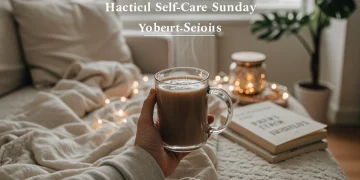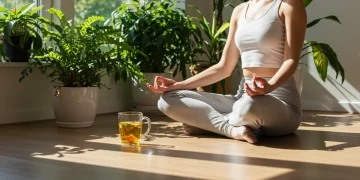Boost Your Mood: 5 Science-Backed Self-Care Activities

Advertisements
Boost Your Mood: 5 Scientifically-Backed Activities for a Joyful Self-Care Sunday explores five activities, grounded in scientific research, to enhance your well-being, promoting relaxation, mindfulness, and overall happiness for a more fulfilling Sunday.
Ready to Boost Your Mood: 5 Scientifically-Backed Activities for a Joyful Self-Care Sunday? Transform your Sundays into a sanctuary of self-care, armed with science-backed activities that promise to elevate your mood and overall well-being.
Advertisements
Start with Mindful Meditation
Mindful meditation is a powerful way to center yourself and reduce stress. By focusing on the present moment, you can quiet the noise of daily life.
It’s not about emptying your mind, but rather observing your thoughts and feelings without judgment.
The Science Behind Meditation
Research shows that regular meditation can physically alter the brain. Studies using MRI technology have found that meditation increases gray matter in areas associated with attention, emotion regulation, and mental well-being.
Moreover, meditation reduces activity in the amygdala, the brain’s fear center, leading to lower levels of anxiety and stress.
How to Meditate
Finding a quiet space is essential, but you don’t need any special equipment. A comfortable seat or lying position works perfectly.
Start with just five to ten minutes a day, gradually increasing the time as you become more comfortable. Here’s a brief guide to get you started:
- Find a quiet, comfortable space where you won’t be disturbed.
- Sit or lie down comfortably, closing your eyes if it feels natural.
- Focus on your breath, noticing the sensation of the air entering and leaving your body.
- When your mind wanders, gently redirect your attention back to your breath.
Mindful meditation is a simple yet profound way to enhance your self-care Sunday and promote long-term mental well-being. Even a few minutes of daily practice can make a noticeable difference in your mood and stress levels.

Express Gratitude Through Journaling
Gratitude journaling is a simple yet powerful activity that can significantly boost your mood. Taking the time to reflect on the things you’re grateful for can shift your perspective and increase feelings of happiness.
It’s an opportunity to focus on the positive aspects of your life, even amidst challenges.
Why Gratitude Works
Studies have shown that practicing gratitude can increase happiness by as much as 25%. When you focus on the things you’re grateful for, your brain releases dopamine and serotonin, neurotransmitters associated with pleasure and well-being.
Furthermore, gratitude helps you appreciate the simple things in life, reducing feelings of envy and dissatisfaction.
Getting Started with Gratitude Journaling
You don’t need a fancy journal or elaborate writing skills to reap the benefits of gratitude journaling. All you need is a notebook and a pen, or even a digital document on your computer or phone. Here are some tips to incorporate this practice into your self-care routine:
- Set aside a few minutes each day, preferably in the morning or before bed.
- Write down 3-5 things you’re grateful for, no matter how small they may seem.
- Be specific in your entries, detailing why you appreciate each thing.
- Reflect on how these things make you feel, savoring the positive emotions.
Gratitude journaling is a wonderful way to cultivate positivity and enhance your overall mood. By focusing on the good in your life, you can create a more joyful and fulfilling self-care Sunday and beyond. Keep your expression and gratitude consistent, and your mood will skyrocket.
Engage in Physical Activity
Physical activity is a natural mood booster. When you exercise, your body releases endorphins, which have mood-lifting properties. A Self-Care Sunday is a perfect opportunity to move your body in ways that feel good.
It’s about finding joy in movement, not punishing yourself with intense workouts.
The Science of Exercise and Mood
Beyond endorphins, physical activity has numerous benefits for mental health. Regular exercise can reduce symptoms of depression and anxiety, improve sleep quality, and boost self-esteem.
It also promotes neuroplasticity, helping your brain adapt and grow, which can improve cognitive function and resilience to stress.
Finding Activities You Enjoy
The key to sticking with physical activity is to find something you genuinely enjoy. Whether it’s dancing, swimming, hiking, or yoga, choose activities that make you feel good. You don’t have to spend hours at the gym to reap the benefits.
Consider these options for your Self-Care Sunday:
- Take a brisk walk in nature, enjoying the fresh air and scenery.
- Try a yoga class to stretch your body and calm your mind.
- Dance to your favorite music, letting loose and having fun.
- Go for a swim, enjoying the weightlessness and relaxation.
Physical activity is an essential component of self-care. By incorporating movement into your Self-Care Sunday, you not only boost your mood but also improve your overall well-being. Listen to your body and do what feels good, making exercise a joyful part of your week.

Indulge in a Relaxing Spa Treatment
A relaxing spa treatment can be an exceptional way to enhance your mood, melting away tension and stress. Whether you head to a professional spa or create your own spa day at home can be equally refreshing and therapeutic.
Taking the time to pamper yourself is a powerful act of self-care.
The Benefits of Spa Treatments
Spa treatments such as massages, facials, and aromatherapy have numerous physical and psychological benefits. Massage therapy, for example, can release muscle tension, improve circulation, and reduce pain.
Aromatherapy uses essential oils to stimulate the senses and promote relaxation. Certain scents, such as lavender and chamomile, have calming effects that can lower anxiety and improve sleep.
Creating Your Own Spa Day
You don’t need to spend a fortune at a fancy spa to enjoy the benefits of spa treatments. You can easily create your own relaxing spa day at home with a few simple steps:
- Set the mood with soft lighting, candles, and soothing music.
- Prepare a warm bath with Epsom salts and essential oils.
- Give yourself a facial using natural ingredients like honey and yogurt.
- Apply a hydrating face mask and relax for 15-20 minutes.
Indulging in a relaxing spa treatment is a fantastic way to boost your mood and rejuvenate your mind and body. By creating a serene environment and pampering yourself with soothing treatments, you can transform your Self-Care Sunday into a true sanctuary of well-being.
Connect with Loved Ones
Human connection is crucial for mental and emotional well-being. Spending quality time with loved ones can boost your mood and create a sense of belonging. This connection can take many forms, from a casual phone call to a deep, meaningful conversation.
Reaching out to others can combat feelings of loneliness and isolation.
The Power of Social Connection
Research shows that strong social connections are linked to better mental and physical health. People with close relationships tend to have lower levels of stress, a stronger immune system, and a longer lifespan.
Social support provides a buffer against adversity and helps us cope with challenges.
Ways to Connect
There are many ways to connect with loved ones, even if you can’t be together in person. Here are some ideas for your Self-Care Sunday:
- Call a friend or family member whom you haven’t spoken to in a while.
- Plan a virtual coffee date with a colleague or acquaintance.
- Write a heartfelt handwritten letter to someone you care about.
- Organize a small gathering with friends and family, if possible.
Connecting with loved ones is an essential part of self-care. By nurturing your relationships, you can create a strong support system that enhances your happiness and resilience. Set aside time on your Self-Care Sunday to reach out to those who matter most, strengthening the bonds that bring joy to your life.
Practice a Creative Hobby
Engaging in a creative hobby is a wonderful way to express yourself and boost your mood. Whether it’s painting, writing, playing music, or crafting, creative activities can provide a sense of accomplishment and flow.
They also offer a break from the demands of daily life, allowing your mind to wander and explore new possibilities.
The Benefits of Creativity
Studies have shown that engaging in creative activities can reduce stress, improve cognitive function, and enhance emotional well-being. When you’re immersed in a creative task, your brain enters a state of flow, a state of deep concentration and enjoyment.
This flow state can improve your sense of self-efficacy and boost your confidence.
Finding Your Creative Outlet
Everyone has a creative side, even if you don’t consider yourself an artist. The key is to find an activity that sparks your interest and allows you to express yourself freely. Here are some ideas for your Self-Care Sunday:
- Try painting with watercolors or acrylics, experimenting with colors and techniques.
- Write poetry or short stories, letting your imagination run wild.
- Play a musical instrument, even if you’re a beginner.
- Engage in crafting activities like knitting, crocheting, or jewelry making.
Practicing a creative hobby is a fulfilling way to boost your mood and nurture your inner artist. By dedicating time to creative expression on your Self-Care Sunday, you can unlock new sources of joy and fulfillment in your life. So pick up a brush, a pen, or an instrument, and let your creativity flow!
| Key Points | Brief Description |
|---|---|
| 🧘 Meditation | Focus on the present to reduce stress. |
| ✍️ Gratitude Journaling | Reflect on things you’re grateful for. |
| 💪 Physical Activity | Exercise releases endorphins, boosting mood. |
| 🎨 Creative Hobby | Express yourself through painting, music, or writing. |
Frequently Asked Questions
▼
Start with 5-10 minutes daily and gradually increase as you feel more comfortable. Consistency is key, even short sessions can provide benefits.
▼
Write down 3-5 things you’re grateful for, no matter how small. Be specific about why you appreciate each item and how it makes you feel.
▼
Choose activities you enjoy, whether it’s walking, dancing, yoga, or swimming. The key is to get moving and have fun, not to push yourself too hard.
▼
Yes, create a relaxing environment with soft lighting, candles, and a warm bath. Use natural ingredients for facials and apply a hydrating face mask.
▼
Strong social connections provide a sense of belonging and support. Reach out to friends and family through calls, letters, or small gatherings to strengthen these bonds.
Conclusion
Incorporating these five scientifically-backed activities into your Self-Care Sunday can significantly enhance your mood and contribute to your overall well-being. From mindful meditation to creative hobbies, each activity offers unique benefits for your mental and emotional health. Make self-care a priority, and enjoy the positive impact these practices can have on your life.





